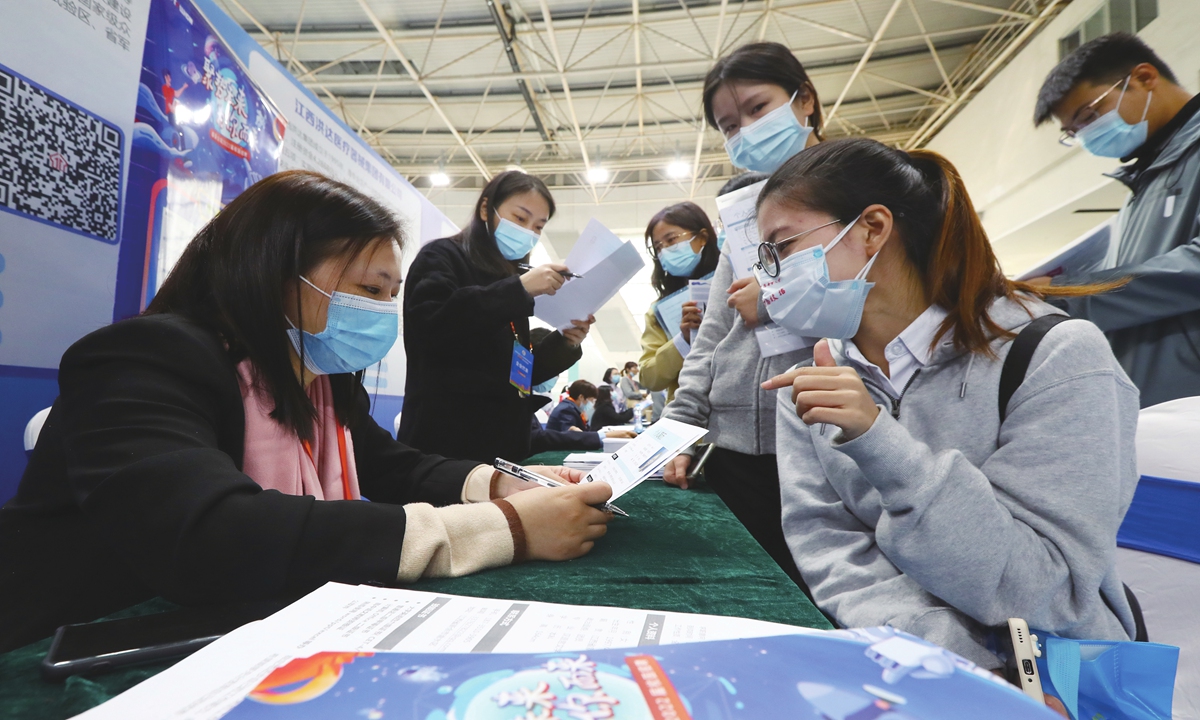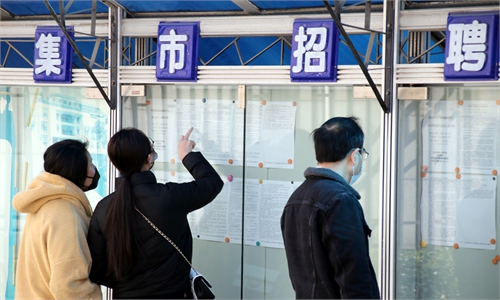
A student (right) asks questions at a job fair in Nanchang, East China's Jiangxi Province on October 23, 2021.About 10.76 million college graduates in China are estimated to enter the job market in 2022.Photo:cnsphoto
China's 2022 Work Report said more than 10 million students are expected to join the job market this summer, which media reported would be the largest ever. Challenged by mounting employment pressure, Chinese lawmakers and political advisors put forward their proposals suggesting strengthening the occupational guidance and developing the anti-employment discrimination law.
According to data released by the Ministry of Education, the number of college graduates in 2022 is expected to reach 10.76 million, an increase of 1.67 million year-on-year. Li Chang'an, a professor at the University of International Business and Economics' School of Public Administration, told the Global Times on Thursday that the employment situation this year would be grimmer.
Zheng Yali, a deputy of the National People's Congress (NPC) and president of Zhejiang Financial College, said that the impact of COVID-19 on employment continues. Zheng noted that production and operations of some industries and enterprises have yet to return to their pre-epidemic levels, some small- and medium-sized enterprises still lack the capacity to expand employment, structural problems in employment have not been fundamentally alleviated, and employment and recruitment difficulties still exist.
Zhang Fengbao, a member of the National Committee of the Chinese People's Political Consultative Conference and former vice president of Tianjin University, said that China's industrial transformation and upgrading and technological progress are accelerating, and requirements for skills and qualities are gradually changing from single to comprehensive skills. Graduates with diversified skills requirements and diverse job responsibilities are more popular in the market.
Behind the complex and changing employment situation, there are also many opportunities, Li said, noting that central and local governments have issued favorable policies for employers, which provide an important guarantee for promoting more full and high-quality employment for college graduates.
Li Xiaoxuan, another NPC deputy, suggested that schools put the career planning education and employment guidance through the whole process of talent training.
Zheng said schools should launch online courses to provide classified employment guidance based on lectures and consultations. Schools can also organize more activities such as "workplace experience trips" to make students experience life in the workplace, and improve their adaptability and quality.
Government departments should vigorously expand market-oriented employment channels and pool market-oriented and socialized employment and entrepreneurship resources, suggested Zhou Hongyu, an NPC deputy and president of Changjiang Educational Research Institute. Zhou called on expanding the implementation of national community-level employment programs.
The current employment difficulties that graduating students face also come from the increasingly widespread employment discrimination, said Qiu Licheng, another NPC deputy and professor at Yanshan University. He proposed strengthening anti-employment discrimination legislation. "We should draw experiences from some other countries in ensuring employment equality, and formulate special laws with clear rights and obligations to build a sound legal and regulatory system against discrimination, Qiu said.
According to the government work, China plans to use the 100 billion yuan ($15.8 billion) unemployment insurance fund to support job stabilization and training and foster urgently needed talent in the manufacturing industry. One of the key economic and development targets that China has set for 2022 is at least 11 million new jobs in cities and towns.


